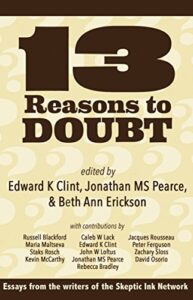The Unnecessary Science
By Gunther Laird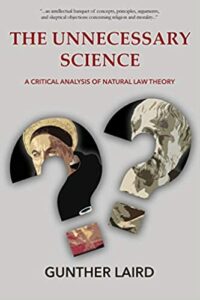 The Unnecessary Science is a necessary contribution to the debate over natural law theory in contemporary moral, metaphysical, and legal contexts. The intellectual foundations of natural law theory were laid by Aristotle, expanded by Thomas Aquinas, and refined by modern proponents such as Edward Feser. It is with all three of these thinkers that Gunther Laird takes issue.
This book is a meticulous critique of natural law theory, as proposed by these philosophers, with Laird pointing out myriad issues with the theory as pertaining to ethics (sexual and otherwise), essences, religion, philosophy of change, and the existence of God, among many other subjects. For anyone wondering what is wrong with both modern and ancient conceptions of natural law theory, this book is an essential read. For those comfortable in their belief in natural law theory, this book is equally as essential to understanding the strongest arguments of the theory’s foes. Laird’s book is the perfect foil to the writing of Feser, Aquinas and other natural-law adherents past and present.
“…an intellectual banquet of concepts, principles, arguments, and skeptical objections concerning religion and morality that draws upon the ideas of two of the greatest philosophers of western thought: Aristotle and Aquinas—as clarified and defended by the modern Catholic philosopher Ed Feser. Laird provides an antidote to Feser’s conservative Catholic views…”
– Bradley Bowen, The Secular Outpost
The Unnecessary Science is a necessary contribution to the debate over natural law theory in contemporary moral, metaphysical, and legal contexts. The intellectual foundations of natural law theory were laid by Aristotle, expanded by Thomas Aquinas, and refined by modern proponents such as Edward Feser. It is with all three of these thinkers that Gunther Laird takes issue.
This book is a meticulous critique of natural law theory, as proposed by these philosophers, with Laird pointing out myriad issues with the theory as pertaining to ethics (sexual and otherwise), essences, religion, philosophy of change, and the existence of God, among many other subjects. For anyone wondering what is wrong with both modern and ancient conceptions of natural law theory, this book is an essential read. For those comfortable in their belief in natural law theory, this book is equally as essential to understanding the strongest arguments of the theory’s foes. Laird’s book is the perfect foil to the writing of Feser, Aquinas and other natural-law adherents past and present.
“…an intellectual banquet of concepts, principles, arguments, and skeptical objections concerning religion and morality that draws upon the ideas of two of the greatest philosophers of western thought: Aristotle and Aquinas—as clarified and defended by the modern Catholic philosopher Ed Feser. Laird provides an antidote to Feser’s conservative Catholic views…”
– Bradley Bowen, The Secular Outpost
Science and Spirituality: An Introduction for Students, Secular People & the Generally Curious
By Dr. Joseph J Berger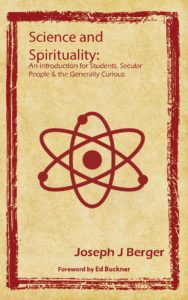 This book provides a short introduction to humanism, aimed at students, young people and those seeking to understand a world without God and those who believe in a science-based, naturalistic worldview.
This book provides a short introduction to humanism, aimed at students, young people and those seeking to understand a world without God and those who believe in a science-based, naturalistic worldview.
Berger takes the reader on a whistle-stop tour of the universe absent of a god and finds it to be enlightening, rather than scary; meaningful, rather than aimless; hopeful and rational.
Science and Spirituality is a refreshing introduction to the non-religious scientific worldview. Joseph Berger offers clarity to how religious and irreligious ideas do or do not entwine with science, making these complex topics accessible without opinion. This book is the perfect place to start in one’s journey to better understand the role of religion and science in shaping our view of one another and the world.
– Kristin Wintermute, Director of Education at the American Humanist Association
Dot, Dot, Dot: Infinity Plus God Equals Folly
By Dr. James A. Lindsay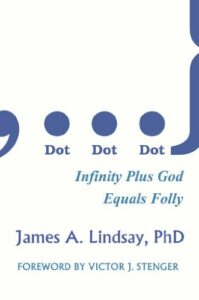 Infinity and God have been close bedfellows over the recent millennia of human thought. But this is James A. Lindsay’s point. These two ideas are thought, mere concepts. Lindsay shows in a concise and readable manner that infinity is an abstraction, and shows that, in all likelihood, so is God, particularly if he has infinite properties.
Infinity and God have been close bedfellows over the recent millennia of human thought. But this is James A. Lindsay’s point. These two ideas are thought, mere concepts. Lindsay shows in a concise and readable manner that infinity is an abstraction, and shows that, in all likelihood, so is God, particularly if he has infinite properties.
“Timely, important and very readable, this book pulls the rug from under theists’ feet.” – Jonathan MS Pearce, The Little Book of Unholy Questions
“Read this to avoid making any more cardinal sins and learn how much math is an amazing human endeavor.” – Aaron Adair, PhD, The Star of Bethlehem: A Skeptical ViewThe Star of Bethlehem: A Skeptical View
By Dr. Aaron Adair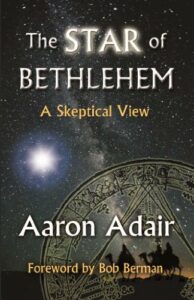 The Star of Bethlehem: A Skeptical View is an analysis of the astronomical portent found in the Gospel of Matthew which supposedly led the Magi from the East to the birthplace of Jesus. Throughout history, people have tried to connect the Star to real, naturalistic phenomena, as well as to explain it in other ways. Adair takes a thorough look at all of these explanatory attempts, using the tools of science and astronomy, and finds them fundamentally wanting. Take a trip through the heavens above with Adair as he critically explores many centuries of flawed hypotheses, looking to answer the question “Did the Star of Bethlehem really exist?” This book is at the conjunction of science and religion.
The Star of Bethlehem: A Skeptical View is an analysis of the astronomical portent found in the Gospel of Matthew which supposedly led the Magi from the East to the birthplace of Jesus. Throughout history, people have tried to connect the Star to real, naturalistic phenomena, as well as to explain it in other ways. Adair takes a thorough look at all of these explanatory attempts, using the tools of science and astronomy, and finds them fundamentally wanting. Take a trip through the heavens above with Adair as he critically explores many centuries of flawed hypotheses, looking to answer the question “Did the Star of Bethlehem really exist?” This book is at the conjunction of science and religion.
Not Seeing God: Atheism in the 21st Century
Ed. Jonathan MS Pearce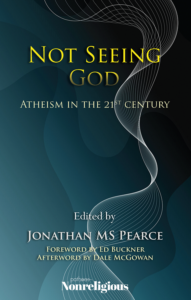 Atheism is an evolving worldview – not the single proposition that God does not exist, but everything else that might or might not go with it. With only a single sentence about the existence of single entity, there is huge scope – necessity, even – for having to reasonably work everything else out. It’s a lot more difficult to figure out the world when it’s not handed to you in an old, outdated book. The world is sometimes a complicated place. With this in mind, Not Seeing God looks at the challenges of leaving religion, arguing for atheism, the role and position of atheism in society and where we go from here. This anthology of chapters from the writers of Patheos Nonreligious is a cornucopia of skeptical delights and is a necessary addition to any nonbeliever’s bookshelf, as well as that of the questioning believer. From philosophy to psychology, politics to cinema, the military to folklore, it’s all here in glorious variety, at the crossroad of atheism and society.
Atheism is an evolving worldview – not the single proposition that God does not exist, but everything else that might or might not go with it. With only a single sentence about the existence of single entity, there is huge scope – necessity, even – for having to reasonably work everything else out. It’s a lot more difficult to figure out the world when it’s not handed to you in an old, outdated book. The world is sometimes a complicated place. With this in mind, Not Seeing God looks at the challenges of leaving religion, arguing for atheism, the role and position of atheism in society and where we go from here. This anthology of chapters from the writers of Patheos Nonreligious is a cornucopia of skeptical delights and is a necessary addition to any nonbeliever’s bookshelf, as well as that of the questioning believer. From philosophy to psychology, politics to cinema, the military to folklore, it’s all here in glorious variety, at the crossroad of atheism and society.
Free Will: An investigation in to whether we have free will or whether i was always going to write this book
By Jonathan MS PearceThis book is a fine introduction into the age-old philosophical debate as to whether we have free will, or whether we live determined lives. Pearce approaches the subject in a lively manner, explaining terms clearly and using anecdotes to break down some of the heavier philosophy so that it is available to the popular philosophy reader. Now that we are understanding our genetic heritage and our neurology better, can we account for all our characteristics and decisions? The author also looks at how theories of free will and determinism integrate with religion, particularly Christianity. If we live under the illusion of free will, do religions need reassessing? How does free will work when God knows what we are doing in advance? Does God have free will? How does prophecy interfere with free will? How is our justice system affected if we know exactly why people commit crimes? These and other crucial questions are investigated with a deft touch, and the author uses recent and important scientific findings to support the text supplying a valuable overview to the subject.
The Little Books of Unholy Questions
By Jonathan MS PearceJonathan M.S. Pearce’s second book (after Free Will?) continues along the same philosophical and theological vein, aiming to provide a cumulative case against the existence of God, and more specifically, God’s triple characteristics of omniscience, omnipotence and omnibenevolence. Split into useful categories with an introduction to each category, these are questions that demand to be answered adequately and plausibly in order for the believer to retain a rationally-based faith.
Pearce’s easy writing style and explanation of philosophy, theology and science on the popular level make this book as enjoyable to read as it is thought-provoking. Does God change his mind when prayed to, and why has he never produced a miracle since biblical times that couldn’t have occurred naturally anyway, like re-growing an amputee’s leg? God only knows.
“Pearce demands from God a rational explanation to all of the problems that seem illogical or incoherent. These are … damningly challenging inconsistencies in the Christian narrative that necessarily antagonize any rational reader. If you are still or used to be Christian, “The Little Book of Unholy Questions” is an overview of the critical questions you need to be asking yourself.” – Derek Murphy, Jesus Potter Harry Christ
The Nativity: A Critical Examination
By Jonathan MS Pearce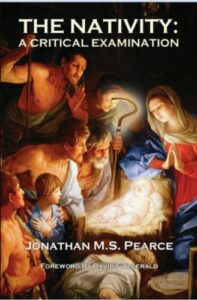 The nativity of Jesus is an event that carries much cultural recognition. However, is it a narrative which commands much support in the academic world? Is it a story which holds much historical truth? Or were the two biblical accounts of the birth of Jesus an opportunity for the authors to impart a theological truth or otherwise?
The nativity of Jesus is an event that carries much cultural recognition. However, is it a narrative which commands much support in the academic world? Is it a story which holds much historical truth? Or were the two biblical accounts of the birth of Jesus an opportunity for the authors to impart a theological truth or otherwise?
These are the sort of questions that are often asked of the nativity accounts and questions which are answered in this concise and yet well-researched and informative book. Some twenty arguments are looked at and presented in a clear and detailed manner, building a cumulative case for the objection to the historical nature of the Gospel accounts. The author also questions what purpose these stories do serve if indeed they do carry little or no historical truth.
With reference to a wide array of contemporary and iconic works on the subject, Pearce has created a compendium of critical arguments against the historicity of a story which still remains a vital piece of our collective cultural and religious tapestry.
“For anyone beginning to doubt the reliability of the gospels as eyewitness accounts, Pearce’s “The Nativity” will teach you everything you need to know to move past the limitations of biblical infallibility and explore the complicated process that went into the gospel narratives of Jesus Christ.” – Derek Murphy, author of Jesus Potter Harry Christ
“excellent” – David Fitzgerald, author of Nailed
Beyond an Absence of Faith: Stories About the Loss of Faith and the Discovery of Self
Edited Jonathan MS Pearce & Tristan Vick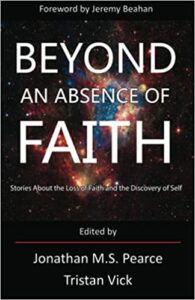 Walking away from faith is never an easy journey. Leaving god and religion behind can be a challenging experience, sometimes even a painful one. Individuals have to consider the impact on family, friends, jobs, and many other aspects of life. This anthology consists of sixteen personal stories by people, from all walks of life, who have made the journey from a life steeped in religion to a life without it. In sharing these heartfelt stories with others, we hope to give those who have questions, who may be on the fence, or who have recently gone through similar experiences a sign that they are not alone. Within these pages you will find hope and inspiration, and perhaps a better understanding of what it means to take brave strides toward living a life without god and religion.
Walking away from faith is never an easy journey. Leaving god and religion behind can be a challenging experience, sometimes even a painful one. Individuals have to consider the impact on family, friends, jobs, and many other aspects of life. This anthology consists of sixteen personal stories by people, from all walks of life, who have made the journey from a life steeped in religion to a life without it. In sharing these heartfelt stories with others, we hope to give those who have questions, who may be on the fence, or who have recently gone through similar experiences a sign that they are not alone. Within these pages you will find hope and inspiration, and perhaps a better understanding of what it means to take brave strides toward living a life without god and religion.
“Beyond an Absence of Faith has the potential to reach those powerful social dimensions of the believer’s mind, while at the same time comforting those who have recently suffered the social and psychological agony of leaving their religions.” — Michael Sherlock, author of I Am Christ: The Crucifixion–Painful Truths
“A beautiful and highly recommended collection of very moving accounts…” — James A. Lindsay, author of Dot, Dot, Dot: Infinity Plus God Equals Folly
13 Reasons to Doubt
Edited by Edward K. Clint, Beth Ann Erickson & Jonathan MS PearceExtraordinary claims and extraordinary evidence.
The mainstream and social media feed our minds a diet of fringe science and outright pseudoscience. They relentlessly stream paranormal, supernatural, and otherwise extraordinary claims. Where do all these come from? They’re spread by shysters and charlatans, by corporate propagandists with cynical eyes on the bottom line, by priests and preachers of all kinds, by axe-grinding cranks and ideologues, and frequently by well-meaning dupes.
This may be a scientific age, but all too often, science, well-grounded scholarship, evidence, and logic are ignored—or even denied.
Scientific skepticism offers a corrective: skeptics defend science and reason, while demanding the evidence for extraordinary claims.
In this volume, we offer you thirteen ways to scientific skepticism: thirteen reasons to doubt extraordinary claims. The authors discuss groupthink and cognitive biases, science denialism, weird archeology, claims about religion and free will, and many other topics. Within these pages, there is something for anyone who wants to avoid biases and fallacies, cut through the masses of misinformation, and push back against fakers and propagandists.
The Problem with “God”: Classical Theism under the Spotlight
By Jonathan MS Pearce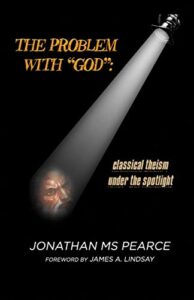
This book sets out a cumulative case that puts classical theism, the belief in an all-powerful, -knowing and -loving God, under the spotlight. God is left wanting as Pearce brings together previous blog writing, adapted pieces and original writing to hammer home the point: classical theism is incoherent. This ebook is perfect for armchair philosophers, Christian apologists, and interested atheists and theists everywhere, as well as packing a solid philosophical punch suitable for the more philosophically inclined reader. Something for everyone.
“The Problem with “God” intends to “put classical theism under the spotlight” and on the rack, and that is a goal that it achieves in one concise essay after another. It constitutes a welcome addition to any library of philosophical challenges to the classical, philosophical conception of God, and for that purpose and all need remaining to it, it is pleasantly recommended.” – James A. Lindsay, author of Dot, Dot, Dot: Infinity Plus God Equals Folly.
Filling the Void: A Selection of Humanist and Atheist Poetry
By Jonathan MS Pearce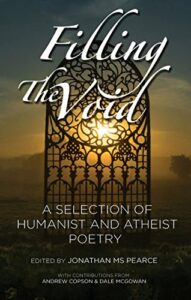 There is often thought, by theists, to be a void in humanist and atheist lives; a god-shaped hole. For many atheists, though, that void is amply filled with meaning and purpose, nobly and morally built up out of philosophy and living a fulfilled life. This volume helps to document that through a wide variety of verse, form, and content with poems from an interesting array of writers, detailing a range of emotions and thoughts.
There is often thought, by theists, to be a void in humanist and atheist lives; a god-shaped hole. For many atheists, though, that void is amply filled with meaning and purpose, nobly and morally built up out of philosophy and living a fulfilled life. This volume helps to document that through a wide variety of verse, form, and content with poems from an interesting array of writers, detailing a range of emotions and thoughts.
The Resurrection: A Critical Examination of the Easter Story
Jonathan MS Pearce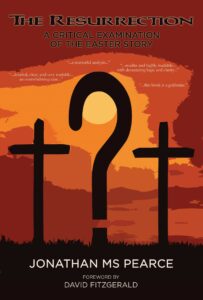 The Resurrection story is integral to the Christian faith; its truth has been crucial for Christians since the inception of the belief system. But did the events reported in the Christian Bible actually happen? How do the claims made by the authors look in light of careful historical analysis? Are the Gospel claims internally coherent? Do Christian believers have justification in believing the chapter and verse of this most famous of miraculous stories?
Jonathan MS Pearce looks at all of the problems with the Easter story in the same way he analysed the Nativity accounts in the sister book The Nativity: A Critical Examination. This later book is a diligent examination of the Easter story, the claims, the likelihood of truth, and what may have been the original events that inspired the biblical writers and believers to write and believe what they did. And still do. Historical, philosophical, and biblical exegetical analysis are woven together to form a terminal case against the accuracy, and ultimately truth, of the Easter story.
“[I]f you want to take such a belief seriously, read this thoroughly documented terminal case against the resurrection based on the latest research! This is the only book you’ll need. Pearce is your expert guide on all the essential issues.”
– John W. Loftus, author, and editor of The Case against Miracles
“Jonathan MS Pearce puts the resurrection genie back in the bottle (and the body back in the grave). If you are digging for truth, this book is a goldmine!”
– Dan Barker, author of Godless
“No rational and honest scholar of religion or theologian who asserts that the resurrection of Jesus was an actual event would be able to do so without addressing the compelling counterarguments presented by Jonathan Pearce’s The Resurrection…. Pearce offers a masterful analysis of the central miracle of Christianity, Jesus’s purported return from death…. All of this makes it difficult to refute…that the entire narrative upon which the Christian faith is anchored is a fiction contrived by others long after the purported date of the crucifixion…”
– Dr. H. Sidky, Professor of Anthropology, Miami University, and author of Religion, Supernaturalism, the Paranormal and Pseudoscience: An Anthropological Critique
The Resurrection story is integral to the Christian faith; its truth has been crucial for Christians since the inception of the belief system. But did the events reported in the Christian Bible actually happen? How do the claims made by the authors look in light of careful historical analysis? Are the Gospel claims internally coherent? Do Christian believers have justification in believing the chapter and verse of this most famous of miraculous stories?
Jonathan MS Pearce looks at all of the problems with the Easter story in the same way he analysed the Nativity accounts in the sister book The Nativity: A Critical Examination. This later book is a diligent examination of the Easter story, the claims, the likelihood of truth, and what may have been the original events that inspired the biblical writers and believers to write and believe what they did. And still do. Historical, philosophical, and biblical exegetical analysis are woven together to form a terminal case against the accuracy, and ultimately truth, of the Easter story.
“[I]f you want to take such a belief seriously, read this thoroughly documented terminal case against the resurrection based on the latest research! This is the only book you’ll need. Pearce is your expert guide on all the essential issues.”
– John W. Loftus, author, and editor of The Case against Miracles
“Jonathan MS Pearce puts the resurrection genie back in the bottle (and the body back in the grave). If you are digging for truth, this book is a goldmine!”
– Dan Barker, author of Godless
“No rational and honest scholar of religion or theologian who asserts that the resurrection of Jesus was an actual event would be able to do so without addressing the compelling counterarguments presented by Jonathan Pearce’s The Resurrection…. Pearce offers a masterful analysis of the central miracle of Christianity, Jesus’s purported return from death…. All of this makes it difficult to refute…that the entire narrative upon which the Christian faith is anchored is a fiction contrived by others long after the purported date of the crucifixion…”
– Dr. H. Sidky, Professor of Anthropology, Miami University, and author of Religion, Supernaturalism, the Paranormal and Pseudoscience: An Anthropological Critique
Mood Disorders: An Introduction
By Dr. Caleb Lack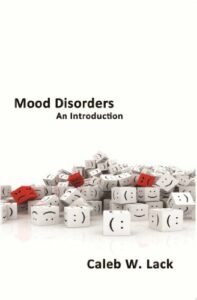 In this book, clinical psychologist and professor Dr. Caleb Lack introduces readers to the class of mental health problems known as the mood disorders. Covering what we know about each of the specific disorders across eight areas (DSM-IV criteria, changes expected in DSM-5, associated features, presentation differences across the lifespan, gender and cultural differences, epidemiology, etiology, and empirically supported treatments), this text is structured in an easily digestible, but still highly informative, fashion.
In this book, clinical psychologist and professor Dr. Caleb Lack introduces readers to the class of mental health problems known as the mood disorders. Covering what we know about each of the specific disorders across eight areas (DSM-IV criteria, changes expected in DSM-5, associated features, presentation differences across the lifespan, gender and cultural differences, epidemiology, etiology, and empirically supported treatments), this text is structured in an easily digestible, but still highly informative, fashion.
Anxiety Disorders: An Introduction
By Dr. Caleb Lack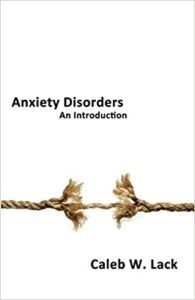 In this book, clinical psychologist and professor Dr. Caleb Lack introduces readers to the class of mental health problems known as the anxiety disorders. Covering what we know about each of the specific disorders across eight areas (DSM-IV criteria, changes expected in DSM-5, associated features, presentation differences across the lifespan, gender and cultural differences, epidemiology, etiology, and empirically supported treatments), this text is structured to in an easily digestible, but still highly informative fashion.
“In Anxiety Disorders: An Introduction Dr. Caleb Lack artfully depicts the nature, clinical features, and empirical treatment literature associated with anxiety disorders. This volume is a must-have for any clinician or researcher given the high quality of writing, concise but thorough nature in which information is conveyed, and clinical utility.” – Eric Storch, Ph.D., All Children’s Hospital Guild Endowed Chair Professor, University of South Florida
“… a succinct overview of anxiety disorders… an honest appraisal of the strength and weaknesses of various approaches to identification… This book is an excellent introduction or reference for students and practitioners.” – B. Scott Singleton, PsyD, BCBA-D, NCSP, University of Central Oklahoma
In this book, clinical psychologist and professor Dr. Caleb Lack introduces readers to the class of mental health problems known as the anxiety disorders. Covering what we know about each of the specific disorders across eight areas (DSM-IV criteria, changes expected in DSM-5, associated features, presentation differences across the lifespan, gender and cultural differences, epidemiology, etiology, and empirically supported treatments), this text is structured to in an easily digestible, but still highly informative fashion.
“In Anxiety Disorders: An Introduction Dr. Caleb Lack artfully depicts the nature, clinical features, and empirical treatment literature associated with anxiety disorders. This volume is a must-have for any clinician or researcher given the high quality of writing, concise but thorough nature in which information is conveyed, and clinical utility.” – Eric Storch, Ph.D., All Children’s Hospital Guild Endowed Chair Professor, University of South Florida
“… a succinct overview of anxiety disorders… an honest appraisal of the strength and weaknesses of various approaches to identification… This book is an excellent introduction or reference for students and practitioners.” – B. Scott Singleton, PsyD, BCBA-D, NCSP, University of Central Oklahoma
Obsessive-Compulsive Disorder: Etiology, Phenomenology, and Treatment
By Dr. Caleb LackObsessive-Compulsive Disorder: Etiology, Phenomenology, and Treatment provides an introduction to the fascinating wor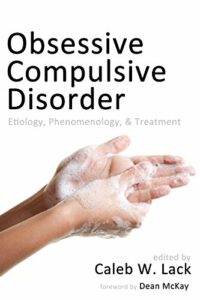 ld of those with problematic obsessions and compulsions. Some of the world’s leading researchers and clinicians contribute chapters to this volume, which covers everything from the causes of OCD, to how it manifests across different cultural settings, to evidence-based treatments. Both new clinicians and those experienced with the disorder will find useful information inside, as will those seeking to learn more for themselves or their family members.
ld of those with problematic obsessions and compulsions. Some of the world’s leading researchers and clinicians contribute chapters to this volume, which covers everything from the causes of OCD, to how it manifests across different cultural settings, to evidence-based treatments. Both new clinicians and those experienced with the disorder will find useful information inside, as will those seeking to learn more for themselves or their family members.
Psychology Gone Astray: A Selection of Racist & Sexist Literature from Early Psychological Research
Edited by Dr. Charles Abramson & Dr. Caleb Lack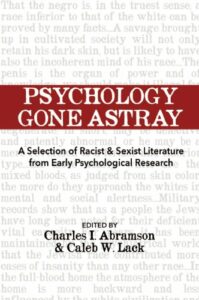 In the relatively short history of psychology as a science, our understanding of human behavior, cognition, emotion, and perception has moved forward in leaps and bounds. This knowledge is frequently applied today to help make improvements in people’s lives, from more effective therapies for the mentally ill to educational strategies to increased work productivity.
In the relatively short history of psychology as a science, our understanding of human behavior, cognition, emotion, and perception has moved forward in leaps and bounds. This knowledge is frequently applied today to help make improvements in people’s lives, from more effective therapies for the mentally ill to educational strategies to increased work productivity.

